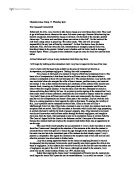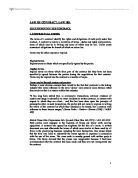U5340061 Patrick Lecan 144 words Bingham LJ's statement expresses well the purpose of the doctrine of frustration which is to moderate the general rule, as expressed in Paradine v. Jane (1647), that, unless they have been expressly qualified, contractual obligations are absolute. It does not tell us much about the underlying principles of the doctrine. How and when does it apply and what are the effects? Contract law needs certainty and a doctrine that excuses parties from the performance of their obligations must, by necessity, be restrictive and unambiguous. By concentrating on the object of the doctrine, however, the author reflects accurately the courts' modern trend of relying less on an abstract theory justifying the doctrine, and more on an objective interpretation of the contract and the practical situation before them in order to produce a just result. We will see how this development has affected both the ambit of the doctrine and its effects. A contract is frustrated if an event occurs after the contract has been formed which makes it impossible to perform it and this event is outside the control of the parties to the contract. This definition is as valid now as it was when the seminal case of Taylor v Caldwell (1863) was decided. The underlying principle was that there was an implied condition that the parties would be excused from their obligation if







